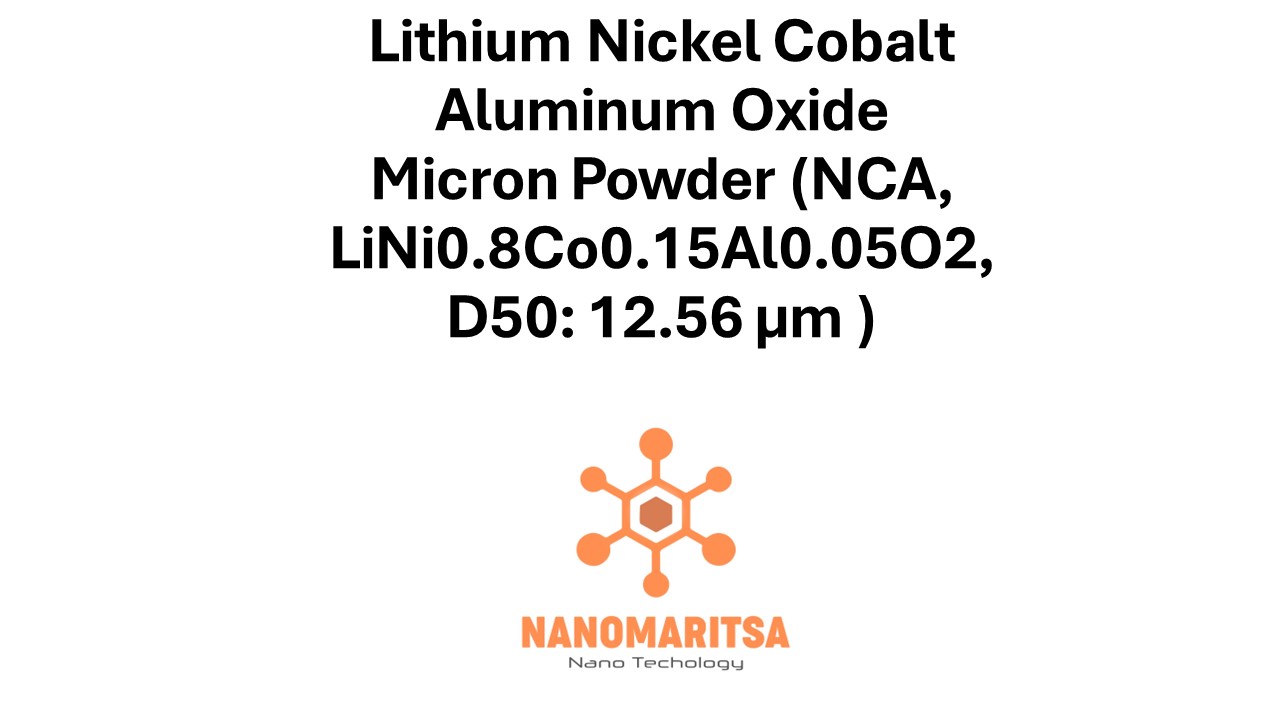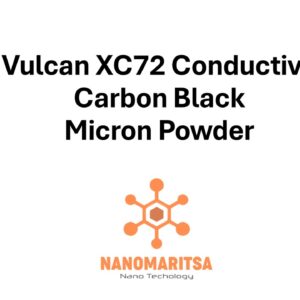Lithium Nickel Cobalt Aluminum Oxide Micron Powder (NCA, LiNi₀.₈Co₀.₁₅Al₀.₀₅O₂, D50: 12.56 µm) is a high-performance cathode material used primarily in lithium-ion batteries. Known for its high energy density, excellent cycle stability, and improved thermal stability, this material is widely employed in advanced energy storage applications, including electric vehicles (EVs), grid storage systems, and portable electronics. The specific composition of LiNi₀.₈Co₀.₁₅Al₀.₀₅O₂ offers a favorable balance between performance, cost, and safety, while the D50 particle size of 12.56 µm ensures efficient processing and battery performance.
1. Key Properties
Chemical Composition (LiNi₀.₈Co₀.₁₅Al₀.₀₅O₂) The balanced combination of nickel, cobalt, and aluminum in this cathode material enhances its energy density, stability, and safety. The high nickel content provides excellent capacity, while cobalt stabilizes the structure, and aluminum improves thermal stability and extends battery life.
Particle Size (D50: 12.56 µm) The optimal particle size ensures better dispersion in battery cells, enhancing the overall performance, charge/discharge rates, and cycle life of lithium-ion batteries.
High Energy Density The high nickel content in the LiNi₀.₈Co₀.₁₅Al₀.₀₅O₂ structure offers an energy density higher than conventional materials, providing longer battery life and better power output.
Thermal Stability The addition of aluminum improves the thermal stability of the material, making it safer and more reliable under high-temperature conditions.
Long Cycle Life The material exhibits excellent cycling stability, ensuring the battery maintains its capacity and efficiency over many charge/discharge cycles.
Improved Safety Compared to other nickel-based cathodes, NCA offers improved structural integrity and reduces the risk of thermal runaway, enhancing the safety of batteries, particularly in high-performance applications.
2. Applications
Electric Vehicles (EVs) Used as a cathode material in lithium-ion batteries for electric vehicles, NCA provides high energy density and long-lasting performance, enabling EVs to achieve longer ranges and faster charging times.
Energy Storage Systems (ESS) NCA is a key component in large-scale energy storage systems, where high energy density and long cycle life are critical for stabilizing renewable energy sources like solar and wind.
Portable Electronics Employed in high-performance rechargeable batteries for smartphones, laptops, tablets, and other consumer electronics, offering efficient power storage and long battery life.
Grid Storage and Backup Systems NCA is used in backup power systems and uninterruptible power supplies (UPS), providing reliable and efficient energy storage for critical infrastructure and emergency power applications.
Aerospace and Military Lithium-ion batteries with NCA are also used in aerospace and military applications, where high power, energy density, and safety are paramount.
3. Advantages
High Energy Density The high nickel content provides superior capacity, allowing batteries to store more energy in a smaller volume, improving overall performance in electric vehicles and energy storage systems.
Excellent Thermal Stability The addition of aluminum enhances the material’s thermal stability, reducing the risk of overheating and improving the safety of lithium-ion batteries.
Long Cycle Life NCA offers excellent cycling stability, ensuring that batteries retain their performance over long periods and many charge/discharge cycles.
Improved Safety The structure of NCA minimizes the risk of thermal runaway, making it a safer option for high-performance applications, including EVs and energy storage systems.
Cost-Effective Performance While NCA offers superior performance compared to other lithium battery chemistries, it remains cost-effective due to its efficient use of raw materials and energy density.
4. Recent Trends and Research
Electric Vehicle Market Growth As the demand for electric vehicles increases, research on NCA is focused on improving its energy density, safety, and performance to meet the growing needs of the EV market.
Battery Recycling With the rise in battery use, particularly in EVs, there is ongoing research into efficient recycling methods for lithium-ion batteries, including those with NCA cathodes, to recover valuable materials like lithium, nickel, and cobalt.
Solid-State Batteries Research into solid-state batteries, which use solid electrolytes instead of liquid ones, may incorporate NCA as a key material for improving energy density and safety in next-generation battery technologies.
Performance Optimization Scientists are exploring various ways to improve the stability and efficiency of NCA, such as by doping the material with other elements or optimizing the manufacturing processes to improve performance and reduce costs.
Sustainable Materials There is increasing research into finding sustainable and eco-friendly ways to extract and process the raw materials for NCA, as well as improving the recyclability of NCA-based batteries.
5. Future Prospects
Electric Vehicle Expansion As the adoption of electric vehicles grows, NCA’s role in providing high-performance, long-lasting, and cost-effective energy storage solutions will continue to expand.
Renewable Energy Storage The growing demand for efficient energy storage solutions for renewable energy sources, such as solar and wind, will drive the use of NCA in large-scale energy storage systems.
Next-Generation Battery Technologies NCA will continue to play an integral role in the development of next-generation lithium-ion batteries and may find use in emerging battery technologies, such as solid-state batteries and lithium-sulfur batteries.
Sustainable Energy Solutions The push toward sustainable energy systems and the need for efficient, high-capacity batteries will further increase the demand for NCA-based materials in energy storage and power systems.
Battery Recycling and Sustainability As battery recycling technologies improve, the recovery and reuse of NCA materials will help to reduce environmental impacts and secure a sustainable supply of critical materials like lithium, nickel, and cobalt.
With its LiNi₀.₈Co₀.₁₅Al₀.₀₅O₂ composition, D50 particle size of 12.56 µm, and high energy density, Lithium Nickel Cobalt Aluminum Oxide Micron Powder (NCA) is a key material for high-performance lithium-ion batteries used in electric vehicles, energy storage systems, and portable electronics. Its combination of energy density, thermal stability, safety, and long cycle life ensures its ongoing importance in the development of next-generation energy storage technologies.






